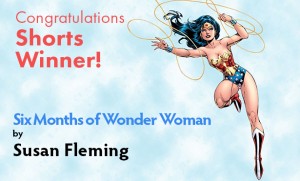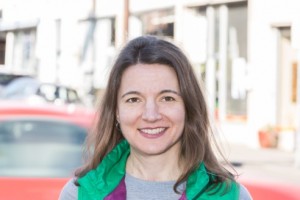As the 2014 Film Coordinator for the Willamette Writers Conference, I was also in charge of overseeing the FiLMLaB competition. Round after round of judging took place until five scripts elevated to the coveted “finalists” stage. Those five finalist scripts were sent to Hollywood for our celebrity judge’s review.
Susan Fleming’s SIX MONTHS OF WONDER WOMAN made the top five. Although her script didn’t win FiLMLaB’s Grand Prize, a year later it won the BlueCat Screenplay Competition for best short film and a cool ten thousand dollars (you can read the BlueCat interview here).
I asked Susan if she could share with us about her experience after she went on to win BlueCat:
MA – Susan, first off, congratulations again on winning BlueCat. That’s HUGE! Gordy Hoffman has been a regular contributor to the Willamette Writers Conference, and is doing great things to help aspiring screenwriters get noticed.
SF – BlueCat is a great competition because everyone who enters get notes. They’ve been very supportive. I really recommend contests like BlueCat and like FiLMLaB where the relationship is whole-hearted and doesn’t end with the prize. I don’t think I would have entered BlueCat if it hadn’t been for the encouragement from FiLMLaB.
MA – As you know, the FiLMLaB contest changes from year to year. Sometimes it’s tied to the theme of the conference or a particular writing prompt. In 2014, the prompt was that it had to be filmmable at the WW Writers House. Did you create the script specifically for the FiLMLaB competition (or was it an existing story), and how did you become familiar with the required setting?
SF – I did create the script for the contest. I have a love/hate relationship with prompts! My first reaction is usually to feel limited, but what themes end up doing for me is inviting me to go somewhere I haven’t gone before. I’ve spent many days in the WW Writers House and have accomplished a lot of good work there, so I felt very familiar with the space. I’m usually holed up in the Bloomsbury Room, and that’s where my script started. As I wrote I could see the rest of the story unfolding and I almost felt like I was watching in my head and just writing down what I saw.
MA- FiLMLaB’s scripts are limited to seven pages or fewer, or they’re disqualified. How many pages were in the BlueCat script? If it was longer, in what ways did you elaborate?
SF – The script is seven pages, and is essentially the same one I submitted to WW. I used to write short stories and my masters’ thesis was a collection of short fiction, so I’m comfortable with short pieces and like the economy of them. I’m not a super verbose person, so I think all these short forms are a good fit for me. If I’d written On the Road, it would have been ten pages.
MA – Now that you won BlueCat for your short script, any plans to produce the film?
SF – I would like to produce the film and am currently working on this. Having seen the premieres of each of the past FiLMLaB winners, it has been inspiring to see “real” people making their films. At one point I would have thought this was unattainable, but through Willamette Writers and now through BlueCat it seems, not easy, but do-able.
MA – You’re obviously a talented screenwriter, but what about your awesome blog anxietyasahobby? I love the material you cover. It’s fresh and funny. It speaks to women without coming off as “militant feminist.” When and why did you start the blog?
SF – I started a couple years ago when my kids were preschoolers. Completing shorter pieces just fit my life a little more. It also helped me get over some of my own anxieties about putting my work out there. I’m really not conscious of writing as a woman or for women, but just as a person living life and being honest about the parts of that life that are confusing or difficult.
MA – I also see you have a graduate degree in Fiction. Now that you’re steeped in Screenwriting, do you ever see yourself going back to novel writing? They’re two completely different animals, I know.
SF – If I ever did write a novel, it would be so much better than it ever would have been if I hadn’t learned screenwriting. So much better. Learning the form of a story, how to break it down when it’s not working, being able to understand why something is working or not. I’ve thought it would be fun to write a novel and then adapt the screenplay. Or vice versa? I don’t know. I still think that would be fun.
MA – One last question: what advice would you give to this year’s FiLMLaB’s contestants who didn’t take home the grand prize?
SF – It’s true what they say, “It’s an honor just to be nominated!” It really was. I gained confidence and inspiration from being a FiLMLaB finalist, and that propelled me to keep on going with the script. I would definitely tell this year’s finalists that this is a beginning, not an ending.
MA – Thanks for your time, Susan. It’s truly been a pleasure to read your unique take on the world. I wish you continued success in your writing journey, and hope to see your work on the big screen soon!


